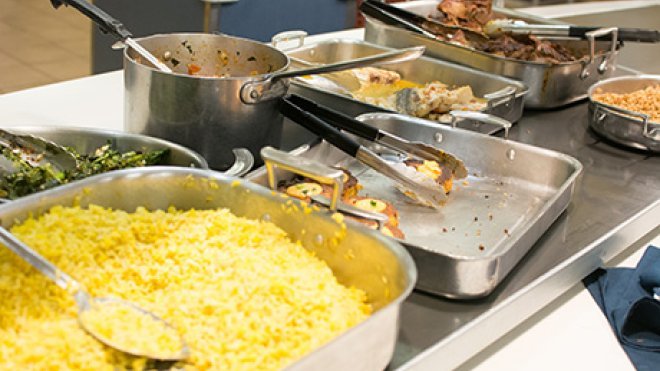Inside the Kitchen: RWU’s Composting Effort
Through a partnership with an outside company RWU has diverted over 230 tons of food waste from the landfill since 2015

This story is part of RWU's Inside the Kitchen series going behind the scenes of RWU’s dining experience.
BRISTOL, R.I. – Food waste is a part of any food service, especially one feeding thousands of people on a daily basis. At Roger Williams University where 5,000 meals are prepared each day, this is no different. But instead of accepting food waste as a natural part of the industry the university in conjunction with its food service provider, Bon Appétit Management Company, has taken steps to curtail its waste.
One way is through the student led Food Recovery Network, which collects unused food at the end of the dining hours at Upper Commons and Baypoint Residence and Conference Center and donates it to local shelters. The other way is through composting.
This is the process of recycling organic material such as vegetable scraps into a rich, nutrient filled soil amendment that can be used in gardening, landscaping or even farming. Compost has been found to help enrich soil, enhancing its fertility and overall health of the plants or vegetables that grow there. Through composting RWU has been able to divert over 230 tons of food waste from the landfill in the last three years. No small success since food waste is the largest type of waste received by landfills.
Composting brings food waste back to the earth, said Andrew Costanzo, the production manager in dining services who oversees RWU’s composting effort. Instead of the food waste going to waste in landfills, this way it gets repurposed, he said. “It benefits everyone.”
RWU partners with Rhode Island-based The Compost Plant, which provides RWU with 30-gallon bins for food waste. The company collects those bins and takes the food waste through its composting process where, put simply, the waste is added to a massive pile of wood chips, grass clippings, manure, mushroom compost and other food scraps and left to “cook” naturally, meaning it breaks down into that familiar rich black compost soil.
In 2017 alone, RWU diverted 91.8 total tons of food waste from the landfill. In 2016, it was 83.52 tons and a total of 61.44 tons in 2015.
RWU breaks its food waste into two parts: pre-consumer waste and post-consumer waste. Pre-consumer waste is any food waste that gets discarded before it is served. That means fruit cores, vegetable peelings, bones used in soup stocks, and fat trimmings among other items. Post-consumer waste is after the food is served to a student or community member. That translates to uneaten food left on a plate or food that gets thrown away. Sometimes that food gets thrown away in bins that aren't provided by the composting company so it's mixed with waste that cannot be composted.
For post-consumer waste that stays within the control of RWU’s dining team, the food doesn’t simply get thrown into one of the bins provided by The Compost Plant, at least not in the Upper Commons. When dishes get placed on the conveyor line there, the dishwashing team puts the food into a food pulper, which grinds the food into a mixed mash, squeezes out the water and then drops it all into a container for composting. The pulper helps reduce the size and weight of the waste, making it possible to store more.
But storing more waste isn’t something the dining team at RWU is looking to do. In fact, it hopes to store less. The dining team is consistently trying to improve their efforts on both pre and post-consumer waste. But while it has certain control on the pre-consumer side, it is looking to get added help on the post-consumer side.
That help can be as simple as people not letting their eyes be bigger than their stomachs said, Chef Jonathan Cambra, director of culinary operations at RWU. That can lead to a great reduction in food waste for the university, which will benefit everyone in the long run.
The decision to take part in a composting effort was made based on the sustainability aspect of Bon Appétit and RWU understanding that it’s the right thing to do, Chef Cambra said. “It’s the right thing to do for the land and it’s the right thing to do for the future.”
But it all depends on everyone doing their part.
Other Stories in this Series:
Behind the Service Line
Food Recovery Network at RWU
Interesting Facts on RWU's Food
Sourced Locally: Where RWU's Food Comes From